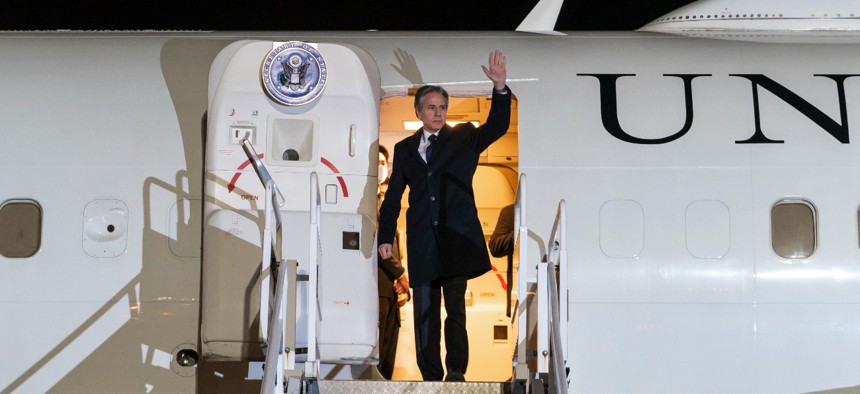
Secretary of State Antony Blinken arrives in Vilnius, Lithuania, on March 6. Ron Przysucha / State Department
The Secretary of State Has One Overarching Message for U.S. Embassy Personnel in Europe: ‘Thank You’
The secretary is abroad for five days continuing the Biden administration’s efforts to counter Russia’s war against Ukraine.
The secretary of State’s travels in Europe this week to continue efforts with partners and allies to counter Russia’s war against Ukraine included thanks to personnel at several U.S. embassies.
Secretary Antony Blinken is traveling to Belgium, Poland, Moldova, Latvia, Lithuania and Estonia from March 3-8 to meet with European leaders and NATO allies. This is amid the second week of the war in Ukraine, which Biden administration officials have repeatedly called “unprovoked and unjustified.”
“To each and every one of you, whether you are locally employed staff, whether you’re a foreign service officer, a civil servant, whether you’re a family member – because you, too, are our frontline diplomats, and we’re so grateful for that – whether you’re a contractor, whether here with one of the other extraordinary agencies that we’re privileged to work with, I really just wanted to come by with two simple words: Thank you,” said Blinken to personnel for the Vilnius (capital of Lithuania) and Minsk (capital of Belarus) U.S. embassies while in Vilnius, Lithuania on Monday. The thanks were in reference to their work during the war in Ukraine, among other things.
Belarus borders Russia and Ukraine and last week the State Department suspended operations in Minsk due to security concerns. Julie Fisher, U.S. envoy to Belarus, said her team will continue their work from Washington, D.C.; New York; Vienna; Vilnius; Warsaw; and other diplomatic posts. Belarus has been supporting Russia, but armed Belarusian forces won't take part in the conflict, Belarus President Alexander Lukashenko said on Friday.
Russia’s aggression in Ukraine has put at risk international principles established after the two world wars, said Blinken. But “what you’re doing every single day here in Lithuania is validating everything we’re doing to try to uphold those principles and so protect the futures of those men, women, and children whose lives are now at stake,” he told staff.
He also commended employees’ resilience during the COVID-19 pandemic and offered some hope that the worst is over.
In Washington, D.C., “we just got to take off our masks at the State Department,” said the secretary. “The Main State [building] itself is coming back to life, cafeteria opening up, the sort of Starbucks coming back, for those of you who know it. So we’re getting there, and you’ll get there too.”
The day before Blinken gave remarks to personnel from the U.S. embassy in Moldova.
“Under normal times, a visit by me or by someone from Washington puts a little extra burden on an embassy,” but “this is not an ordinary time,” said Blinken, acknowledging their work to help the thousands of refugees from Ukraine who’ve crossed the border into Moldova.
He made similar remarks about the pandemic as he did in Lithuania and closed with: “whether you are local staff or whether you’re family; whether you’re a [foreign service officer], a civil servant; whether you’re [from] State, Defense, [U.S. Agency for International Development], Peace Corps, thank you, thank you, thank you.”
Another recent matter involving U.S. embassies was that on Friday the U.S. embassy in Kyiv tweeted that Russia’s attack on the nuclear power plant in Ukraine, which is the largest one in Europe, was a “war crime” and used the hashtag “TheHague,” which is a city in The Netherlands that houses the International Criminal Court.
According to an internal message obtained by NBC News, the State Department sent an urgent message to U.S. embassies in Europe asking them not to retweet that tweet from the Kyiv embassy.
Government Executive asked the State Department on Monday for comment on NBC’s reporting and if the department has received any backlash from embassies as a result of the message sent out.
“The intentional targeting of civilians or civilian objects, including nuclear power plants, is a war crime, and we are assessing the circumstances of this operation,” said a State Department spokesperson on background. “But— regardless of the legality—this action was the height of irresponsibility, and the Kremlin must cease operations around nuclear infrastructure.”
In regard to the tweet situation, Blinken was asked on CNN’s State of the Union on Sunday if the United States has observed evidence on whether Russia is committing war crimes.
“We’ve seen very credible reports of deliberate attacks on civilians, which would constitute a war crime. We’ve seen very credible reports about the use of certain weapons,” the secretary replied. “And what we’re doing right now is documenting all of this, putting it all together, looking at it, and making sure that as people and the appropriate organizations and institutions investigate whether war crimes have been or are being committed, that we can support whatever they’re doing.”







